#shangyin
Text

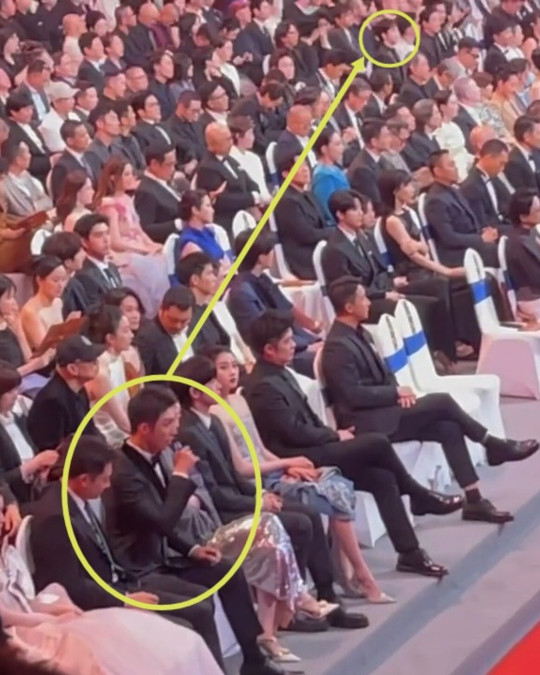
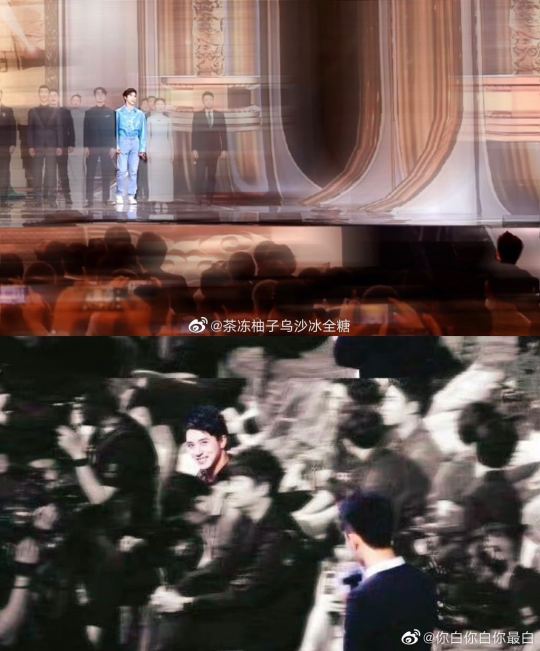


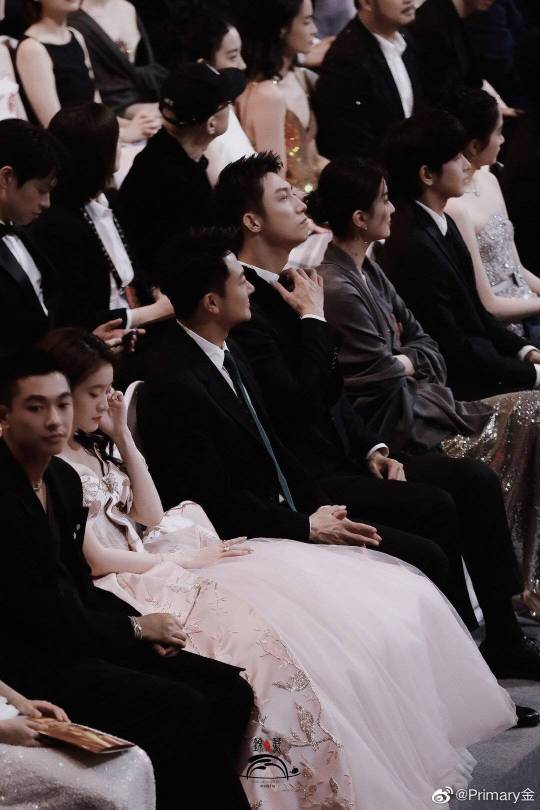
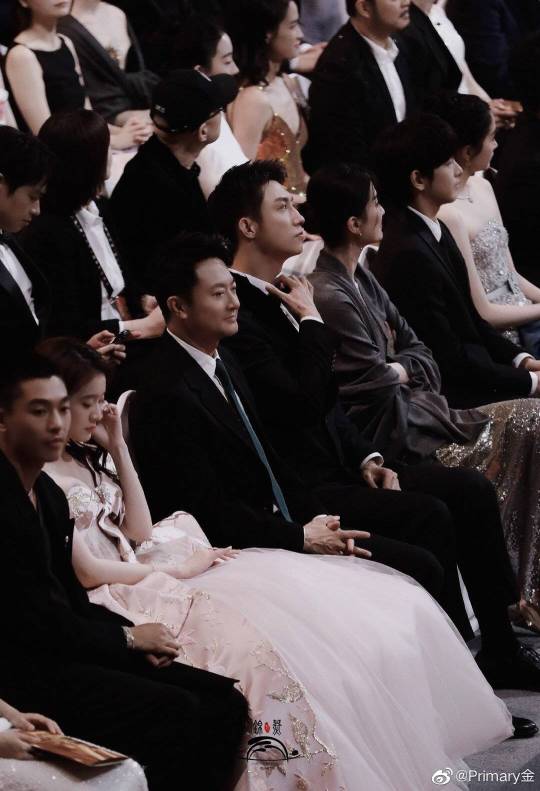
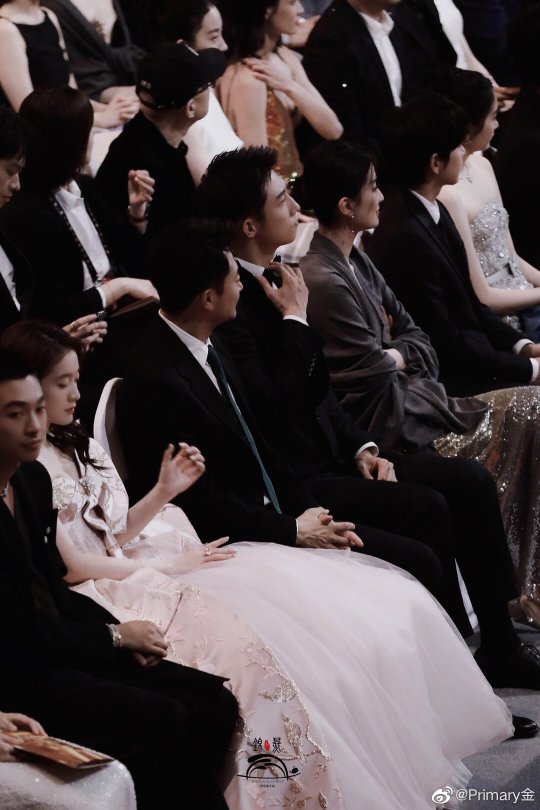


Finally after the 7 years waiting, we can see them in one frame ..
#huang jingyu#addicted web series#yuzhou#johnny huang#gu hai#xu weizhou#shangyin#bai lou yin#chinese actor
34 notes
·
View notes
Text
Bai Luoyin Finally Initiates Kissing with Gu Hai in Addicted (2016)
(This scene is often missing in most places where you can find Addicted streaming online, official or unofficial.) I was quite happy to find the uncensored show on dailymotion.









Episode 15/15
#l watches addicted#addicted#are you addicted?#addicted: heroin#chinese bl#censored bl#cdrama#my bad gifs#huang jingyu#xu weizhou#gu hai#bai luoyin#chai jidan#上瘾#shangyin#johnny huang#timmy xu#not gong jun or xu feng for once
35 notes
·
View notes
Text
2 notes
·
View notes
Text
Addicted/Heroin/Shangyin Fix It
What if Bai Luo Yin had really stood up to Gu Hai after the first kidnapping, redefining their relationship? A fix-it where Gu Hai must face the consequences of his actions.

Gu Hai felt vaguely sick. He reached up as if to hit him.
Bai Luo Yin shifted his gaze. For a moment, Gu Hai thought he saw fear flicker through his eyes. But then, with resolution, he lifted his head again. “Hit me…” he muttered. “Go ahead.”
Gu Hai froze.
“But we are done.”
The way he said it—with clear, unshakable determination—it carved into Gu Hai’s chest like a knife. He let his hand fall.
#addicted heroin#addicted the series#chinese bl#Shangyin#gu hai#bai luo yin#ao3 fanfic#fix it#fanfic
4 notes
·
View notes
Text
To glimpse her shadow, to hear her voice, is to love her.
Li Shang-yin, The Walls of Emerald
#Li Shangyin#Poems of the Late Tang#The Walls of Emerald#love#love quotes#Chinese literature#Chinese poetry#poetry#poetry quotes#quotes#quotes blog#literary quotes#literature quotes#literature#book quotes
50 notes
·
View notes
Text
Happy Gushiwensday Sunday! We have for you tonight a Li Shangyin poem called "On Young Pines."
How I love you, lonely elegant lord, planted in the front courtyard;
how your delicate needles cast soft shade, each one filled with wind.
When peaches and plums spring green and blossom, you're ignored;
when snow and frost take hold, only then do they see your verdancy.
How things change, in a year; how everything flourishing withers;
but at a hundred solid feet you are a pillar worthy of the name.
I'll tell them--in the western garden, crowded with the carriages of guests--
tell them how they'll grieve when it has withered away to nothing.
Notes and original text under the cut.
题小松
怜君孤秀植庭中,细叶轻阴满座风。
桃李盛时虽寂寞,雪霜多后始青葱。
一年几变枯荣事,百尺方资柱石功。
为谢西园车马客,定悲摇落尽成空。
This one completely baffled me when I started translating it because I didn't realize 松 was being used as "pines..." (yes, I think it's the most common meaning, but it's not the one my dictionary pulls up first!) I thought to myself, this all seems EXTREMELY metaphorical. Excited to see what any of these lines have to do with each other. As it turns out it's an extremely literal and straightforward poem about how awesome pine trees are, and if there's any metaphor it's that constancy is undervalued. Here are some notes!
lonely elegant lord --- only on reading Laurence's draft translation did I remember that in poetry 君 is usually used as a second-person pronoun, not to actually reference any kind of gentleman. However, I think this sounds great so I'm keeping it.
each one filled with wind --- literally 满座 "every seat full." This gives me some trouble; 座 is sometimes used as a measure word for immovable objects so as not-a-native-speaker it seems weird to me to use it for leaves.
spring green and blossom --- literally 盛时 "when they are flourishing." I have no real reason for doing this I just think it sounds pretty.
ignored --- 寂寞, a different word for lonely than the one used in the first line. Since it's a binome I feel like it's... lonelier somehow?
take hold --- I think I'd translate the beginning of this line literally as "when snow and frost have come many times." Trying to evoke 'the time of year when they come often.'
at a hundred... worthy of the name --- parsing this line 百尺方资柱石功 gives me a lot of trouble. Particularly 方资, square/honest/correct and resources/capital/expense. In another draft I translated it as "solid growth." The very last character 功 is merit or accomplishment; that's where I derived "worthy of the name."
surely grieve --- you can translate 定悲 as "their sorrow is already decided" which I think kind of rules.
to nothing --- this is actually the back half of the line. We get to use one of my favorite characters 尽 "exhausted" or "to the end" along with the terribly exciting 成空 "becomes void." Thank you Li Shangyin for being so very ominous about the ephemeral nature of reality while telling tourists that you like evergreens more than flowers <3
7 notes
·
View notes
Text
Untitled (III) - Li Shangyin
swallowing desire
this spring evening
the brief view
of night encroaching
noise from your apartment
inviting me to come up, a coward
movement behind the lit screen
desire surges to cross the street, a disgust
ashamed like the white bird
on its perch in your hair
like the phoenix
facing out of the back of your mirror
to its rightful home
comes the Hengtang dawn
the last flowering stars
kissing the colours on my ride
--
无题
含情春晼晚,暂见夜阑干。
楼响将登怯,帘烘欲过难。
多羞钗上燕,真愧镜中鸾。
归去横塘晓,华星送宝鞍。
i don't know enough about actual Tang attitudes towards infidelity (apart from brief asides that are like "less than you, dear reader from a Christian-normative society, would expect") but anyway. i think what matters more is that the shame felt by the narrator of this poem is part and parcel of the erotic function. it's part of the spice!
i was originally only going to translate the first half of this - i wasn't sure i had a solid idea of the last half - but convinced myself to push through anyway. i wanted to do something different from Graham's influential translation ("Bite back passion. Spring now sets"), but it influenced mine for sure. also, unconsciously, "Bring Me the Head of the Preacher Man" ("following desire ... once more we rise").
... kinda wish i'd committed to modernizing this translation more, actually. luan-phoenix phone case. venetian blinds. what the hell.
24 notes
·
View notes
Text
Grounded, the body, I fear,
Is no phoenix,
No hope for wings, singular or paired-off.
from “Untitled (3)” by Li Shangyin (tr. Wong May), in In the Same Light: 200 Tang Poems for Our Century
10 notes
·
View notes
Text
Transcript: Guest episode 李商隐 Li Shangyin - 无题 Untitled
[Listen to the episode here.]
Three translations of an untitled poem by Li Shangyin.
---
finding time to meet is hard; parting is hard too.
we had a hard time meeting, I had a hard time leaving you
the east wind brings in the new season gentle, but it withers the flowers all the same.
the flowers wither when the spring wind's all blown through
it's hard to meet you in time. it's hard to leave you.
the east wind is so soft it can't even move flowers.
spring silkworms until they die spin out worries without rest;
the silkworm sits and spins her thoughts out till the very last
spring silkworms spin their lives into thread until they run out.
a candle burns down to ash and only then its tears begin to dry.
the candle turns to ash and suddenly the tears are in your past
a candle’s tears can’t dry until it’s worn itself to ash.
in the morning mirror you comb over and over your lovely hair.
you recite verse instead of sleeping, in the cold light of the moon---
at sunrise check my mirror and my roots are showing through
at moonrise stumbling over psalms while my lips turn blue
the morning mirror shows my hair clouding over, changing into something else.
night. I can't sleep. poems run out of me. the cold moon watches over my shoulder.
but there's not much road between here and the queen mother's mountain.
a mile or two on down the road is the immortal mountain
not many roads stray close to the mountain dreaming, but
she's close; her green bird always comes to check on you.
queen mother's crow says girl stop sitting counting days without him
the three-legged bird flies to me to say: our lady of peaches is worried for you.
---
Trying to find a pleasing way to arrange these alternate translations together has thrown it into sharp relief for me which lines are very literal and hard to misinterpret, and which lines could be read in multiple ways. The couplet about the silkworm and the candle only varies by minor changes in word order, whereas the line about the east wind and the line about the roads to Mt Penglai can be read in two completely opposite ways. I think my favorite part of this was finding different ways to interpret the allusion to Mt Penglai; in the text it just says “Mt Peng,” but the reader understands this is a mythical mountain, idiomatically something like fairyland, and that the green bird is a messenger of the Queen Mother of the West, who keeps the peaches of immortality and presides over prosperity, longevity, and eternal bliss (according to Wikipedia). She’s a fitting patron for a girl who’s worried about love, and invoking her also gives the poem an east-to-west direction, like the travel of the sun.
9 notes
·
View notes
Text
The meaning of Yu Shengyan 玉生烟 (Jinse "锦瑟” by Li Shangyin 李商隐)
Onto the second poem in Chapter 1.
Let’s talk about Yan Wushi’s subordinate Yu Shengyan.
Not so surprisingly, Yi Shengyan came from the poem “Jinse 锦瑟” written by Li Shangyin 李商隐 in the Tang Dynasty. Yes, it’s the same poet that wrote the poem used in the previous Chapter 1 meta, Chang E so MXS clearly has her favs. This poem’s known for being very difficult to understand, so I hope I do it justice.
Warning: this analysis is going to be a whole ass essay. BUT ANYWAY~
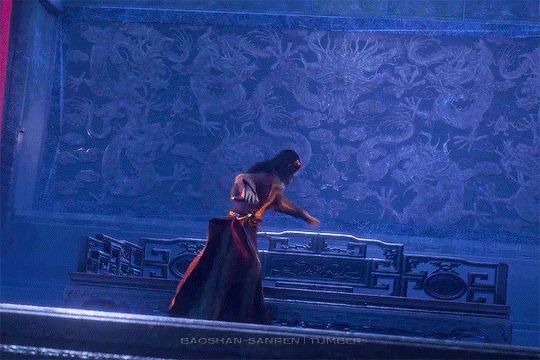
Firstly, the title. The title of the poem was unknown, so the first two words “Jinse” was used as its title. There’s a whole debate around who the target audience is; some people said it was a love poem for a maid named “Jinse”, others said it was a mourning poem for a deceased wife. Some say that he was just lamenting for years that have gone by. Essentially, god knows what he was talking about XD
If anyone's interested, here's an online class that teaches this poem.
youtube
锦瑟无端五十弦,
The exquisite Se has 50 strings for no good reason
The normal Se has 25 strings, and other instruments have a lot less strings. The poet is lamenting in this line, ie. 'wtf do you have so many strings’. It can also be interpreted that the Se symbolises the poet, and he feels that he’s more outstanding than the rest.
There are also many interpretations as to why the poet uses the number 50. Firstly, some think that the 50 strings represent the poet’s age. (ie. He’s approaching 50 and now he’s lamenting about the lost time. Secondly, there is a related legend that was noted in the “Record of the Grand Historian Volume 28 《史记》卷二十八”. Legend has it that that the Heavenly Emperor ordered the Goddess Sunu 素女 to play the 50 string Se. But it was too depressing so the emperor split her Se into 25 strings. Some don’t even think the 50 is important as he has used the number 50 in other poems before. Basically, there’s a whole debate around it.
一弦一柱思华年。
Each string and bridge brings me back to my youthful years.
The bridge is part of the Se. It’s somewhat similar to the knobs of the guitar - ie. changing their position changes the notes. The Se above has 50 strings so it has a complex melody, so it’s implying that the sound of the Se brings to mind many memories.
庄生晓梦迷蝴蝶,
Zhuangzi dances in his dreams and turns into a butterfly.
This term comes from the philosophical text, “Zhuangzi: Zhuang Zhou Dreams of Being a Butterfly”, a classic text written by the ancient Chinese philosopher Zhuangzi. In the story, he dreams he’s a butterfly, but when he woke up, he was confused if he was Zhuangzi dreaming he was a butterfly, or a butterfly dreaming if he was Zhuangzi. The is now a philosophical question that’s discussed worldwide. You can read here for more information.
This line is commonly interpreted as the poem being in a beautiful place, but when he wakes up, he realises it’s as fleeting as a dream.
望帝春心托杜鹃。
Looking at the Emperor that entrusts his sorrow onto the Koel
The Emperor refers to Emperor Wang Di, the king of the ancient country of Shu. Legend has it that when he entered seclusion and passed on, he died and his soul became a Koel. Hence, when Spring goes and when the Koel cries out sadly, the Shu people would say “I look forward to the emperor’s soul”, as though the Koel is sending Spring off.
沧海月明珠有泪,
Under the radiant moon and in the green sea, the Jiaoren sheds tears.
Jiaoren is the equivalent of a Chinese mermaid. It was said that the Jiaoren’s tears would turn to pearls. This is a very vivid imagery of sadness. 沧海 (Green Sea)‘s a term often used in poetry to invoke a sense of vastness
蓝田日暖玉生烟。
It takes the warmth of the day on Lantian before jade emits smoke. (His name has been highlighted in orange.)
Lantian is a county. It’s famous for its jade production. And it was believed that when the light shines, the jade would emit a ‘gas’. It was believed that treasures would release a gas that is invisible to the naked eye. This then symbolises something that’s ideal and perfect, but yet one cannot grasp it or get close to it. This metaphor was believed to share many similarities with another Tang poet Si Kongtu who came before him, who himself quoted another predecessor Dai Shulun. Unfortunately, the origin of this phrase has been lost.
I’ll put a quick summary here. There are 4 different emotions after the poet mentions the strings of the Se. The first is the dreamscape where he describes the confusion of life. The second is the Koel symbolising sadness. The imagery of the Jiaoren invokes a vast sea and loneliness and lastly, the Lantian mountain is that of warmth.
此情可待成追忆,
Why do we only reminisce this now
只是当时已惘然
That’s because the mind was simply inconsolable back then.
The last two lines sum up the first few verses, and that the poet is regretful over the events of the past.
Additional Links
Thousand Autumns Meta
Poetry
20 notes
·
View notes
Text
7 years - 417🥺

8 notes
·
View notes
Text
Moon Goddess’ by Li Shangyin
The candlelight is flickering on my stone screen,
The Milky Way is fading, the Morning Star is falling from the sky.
Moon Goddess, are you not sorry you stole our immortal potion,
Over the blue sea and sky – seeing my lonely heart every night.
Translation Note. For Chánghé, 长河, I used the familiar term Milky Way whereas the Chinese would use Heavenly River. The similar sounding Cháng É, 嫦 娥, the Moon Goddess, is delightful.
Ye Ye Xin is hard to translate. For ye ye, 夜 夜, I come up with “every night” and “heart” for xin, 心. Then I imagine the lonely archer looking up at the sky and the moon, wishing he had been a better ruler and husband.
Well, that’s life and it is too late to deny it.
Fly Me to the Moon
Short poems like Li Shangyin’s Moon Goddess were often put to music. Can you hear the melody of the words –píngfēng, xiăoxīng, língyào, qīngtiān, that’s poetry. There is no denying it.
Similar expressions of the moon and love can be found in 20th century American music.
Moon River, a song composed by Henry Mancini, lyrics by Johnny Mercer, is a well known example. Mercer’s lyrics, “moon river, you heart breaker” captures the feeling of Li’s last line — bìhăi qīngtiān, yè yè xīn, “Blue sea, blue sky, every night can you see my heart.” Okay, some words are implied, but that is true of every poem and song. Fly Me To The Moon, “and let me float among the stars,” a dreamy song by Bart Howard, made famous by Frank Sinatra, also comes to mind. Listen to Billie Holiday’s Blue Moon for a more melancholy mood.
As for poetry, join Li Bai and the moon on any starry night, a connection so strong that it is said he tried to grasp the moon’s reflection from a boat on a lake and drowned.
Chang E and Houyi
Houyi, Lord Archer (to Chang E, his lovely wife): Chang E, on such a morning when the sea and sky are pale blue, when the Heavenly River fades into the distant ocean, and the Morning Star flickers on the water and falls away, Chang E, are you not saddened by the long, lonely nights?
There are several stories about Chang E, the moon goddess. One version tells this tale. Chang’e was a beautiful woman, wife of Houyi, an accomplished archer.
Once upon a time, ten suns rose in the sky, one following another, all day. The land was scorched the crops burned, the people suffered. Lord Archer, Houyi, shot down nine suns, leaving just one. And a grateful Queen Mother of the West gave him an immortal elixir as a reward, enough to share with his wife, Chang E.
Proclaimed king by people in the Middle Kingdom, Houyi became a tyrant. Chang E, fearing that he would rule forever, drank the potion and fled to the moon to escape her hot-tempered husband.
Li Shangyin was a poet of the late Tang dynasty. The forty-five years of his life (c. 813–858) encompassed the turbulent reign of six emperors and the rising influence of the palace eunuchs. The tale of one emperor, Wuzong, recalls the story of Houzi and Chang E and their immortal potion. Wuzong began taking pills hoping to lead to immortality. His mood became angry and he died six years into his reign.
The circumstances of Li Shangyin’s own death are not recorded. He was however considered the last great Tang poet.
3 notes
·
View notes
Text
0 notes
Text
Sima Qian:司馬遷, Lao Tzu:老子, Fan Li:范蠡 - China's most outstanding 6 people (Essay)

Fukki and his wife Joka (snake body)
Since I was a child, I have become familiar with Chinese writing and have learned Chinese philosophy, history books, and Chinese poetry on my own way. However, I hate China, which is too arrogant. The Holocaust that the Chinese Communist Party is doing to the Uighurs, anti-vomiting. I think that China’s fortune is a reasonable end to perish. Before I thought so, I’ve loved Chinese culture, so I shall write the essence I brought back from it. (Summary of previous 6 episodes)
I have learned about Chinese history and celebrities from the "summer" era to the "Tang" era, but I dare to select and rank 5 people from a huge number of people. I tried it. Since there are various genres in which I have been active, I cannot compare them accurately, but I will rank them from a subjective perspective of how much they touched my heart. I'm trying to rank it, but it doesn't make a difference. It is convenient. When I asked my younger brother, "Who do you think I like the most?", He said, "It's not (3),isn’it?." An overview of each person is from the 6th edition of Kojien(Japanese Dictionary). Then, I will write from 5th place to the top.
(5) Li Shangyin(李商隠)
Late Tang poet. He is Gizan(義山). People from Huaizhou Koudai
(Qinyang, Henan). Send his life into his fall. His poetic style, which makes heavy use of allusions and devotes himself to rhetoric, became the ancestor of Song's first Seikontai. He is the author of "Li Gizan Poems" and "Hinan Bunshu". (812? ~ 858)
A great poet who embodies sadness. A deeper poem than Lee Haku(李白) and Du Fu(杜甫). A sad love poem shines.
"Blue jewelry peeking at a crushed boy" (Chinese literary scholar: Kazumi Takahashi's words). His masterpiece is posted at the URL below.
He arranged the books here and there, quickly grabbed the essence of the books, digested and absorbed them, and turned them into blood. This is called "Cut the chapter into Fragment ", and it is also called "Daisai: 獺祭-Otter Festival" because of its appearance. The word "Daisai" became the etymology of Yamaguchi Prefecture's sake: "Dasai".
I want to be like Li Shangyin.
(4) Zhaozhou Conns (Joushu :趙州従諗: 778-897)←long life!
A Zen priest from the Tang dynasty who is a master who guides his disciples from everyday events that look light. When asked and answered with him, many people are enlightened by the humor. There was no mention of him in Kojien. As two examples,
Disciple: I'm stupid and can't do anything. What should I do?
Zhaozhou: Did you eat?
Disciple: I ate it.
Zhaozhou: Then wash the dishes.
(Disciple was enlightened through this exchange of words)
Disciple: Do you: the master fall into hell?
Zhaozhou: Even if I falls. If I myself doesn't fall, who will indoctrinate you?
https://iirei.hatenadiary.com/2021/02/17/044538
In addition, there are other excellent Zen priests in the Tang dynasty, such as Baizhang Huaihai, Obaku kiun, and Izan Reiyu , which are difficult to attach, but this time they are represented by Zhaozhou Congshen.
I want to be like Zhaozhou Congs.
(3) Sima Qian(司馬遷):
Western Han (前漢)historian. He is a child of Shaanxi Natsuyo people. When he was young, he took over the position of his father's talk and became a Taishirei, and he himself called himself Taishikou. He reported that he was indignant because he was sentenced to imprisonment for Li Ling's fall to Xiongnu, and followed his father's aspirations to complete 130 volumes of "History." (Around 145 to 86 B.C.)
This person is indispensable. He himself was history itself. He is familiar with Atsushi Nakajima's "Li Ling".
https://iirei.hatenadiary.com/2021/02/24/035839
I want to be like Sima Qian.
(2) Fan Li (范蠡)
An honorary vassal of Goujian in the Spring and Autumn period. Chu(楚) people. He helped Goujian(勾践), who lost the battle of Kuaiji, to take revenge on Spear of Fuchai(夫差). Later he went down into the field, gained wealth, and was called the Duke of Toshu. → Ceramic red(陶朱公
His way of life is an epic. He is familiar with the subtleties of attack and defense in warfare, treats himself wisely even in peacetime, and becomes a rich man. A person modeled by the Chinese. By the way, my nickname "Rei Morishita:礼 森下" was originally planned to be "Rei Morishita:蠡 森下", but it was too difficult kannji, so I changed it to the current one. There is Manga which drew Fan Li concisely:
"Wu-Yue Burning History" (Chitaro Kubota: product, Fumio Hisamatsu: picture / Kodansha Super Bunko: large book) in the picture, and you can understand in detail about Fan Li.
https://iirei.hatenadiary.com/2021/03/03/022111
I want to be like Fan Li.
(1) Lao Tzu
1) A thinker who is said to have been in China during the Spring and Autumn Warring States period. The ancestor of the Taoist. According to historical records, he has a surname of Lee, a first name of ear, and a character of Tan or Hakuyo. A person from Luyi County (Henan Province). Zhou's guardian room (library room) clerk. When he escaped from the turbulent world and reached Barrier (Hangu barrier or Dasan barrier), Yinxi(尹喜), the guardian of barrier(関守), asked for a way(Tao), so he preached Lao Tzu. → Daode Tianzun.
2) The book of 1). Volume 2. The main body of the universe is called a large or a road(Tao), and the ones in the phenomenon world are relative, and the road is absolute. The compilation is thought to be after Mencius, and at the beginning of the Western Han, a book close to the current book was established. Tao Te Ching.
A giant star of ancient free thought that denied Confucian thought and culture and challenged the good sense of society. ("Lao Tzu": Part of the catchphrase of Chuko Bunko.) The monologue, which can be said to be naive, has even the nastyness of seeing through the hearts of people, and pierces the depths of the reader like a satire. While saying that, there is a wide variety of stories, such as the appearance of female genitals (Chapter 6) and the disclosure of the War Winning Law (Chapter 36).
I want to be like Lao Tzu.
A word of the day: There are many people to talk about in China, and it was difficult to select them. In addition, as a more fictional character than Lao Tzu, the emperor "Fuxi: Fukki or Fukugi(伏羲)" who discovered the principle of I Ching will be added to the (0) th place.
I will assign the 6 people who appeared in this blog to the I Ching Hexagram. If you pile up the swords from the bottom to the top like (5) → (0), you will get a catastrophic hexagram called "Yamakaze Guo: Sanpuuko(山風蠱)". On the other hand, if you pile up (0) → (5), you will get a constructive hexagram called "Takurai Zui(沢雷随)". Both are hexagrams with strong meaning. (For example, in the case of Li Shangyin, I assigned it as a negative shadow, but since this is not a place to explain I Ching, I will pull it from the past log.
https://iirei.hatenablog.com/entry/2021/03/17/053700
I want to be like Fuxi.
In Atsushi Nakajima(敦 中島)'s novel "Gojo Lamentation(悟浄嘆異)," Sun Wukong(孫悟空) advises Zhu Bajie(猪八戒), who is not good at transforming. "I just want to be that person. It's pure. It's the best. Then I can be that person. You can't transform well because you don't have that feeling."
(↑This is very important description through this blog! We can become anybody if we want so.)
#Li Shangyin#Zhaozhou Conns#Sima Qian#Fan Li#Lao Tzu#Fuxi#I Ching#Atsushi Nakajima#Zen#essay#rei morishita
6 notes
·
View notes
Text
君問歸期未有期,
巴山夜雨漲秋池。
何當共剪西窗燭,
卻話巴山夜雨時。
You ask when I will return
No date is set.
On Bashan Mountain the night rain
is flooding the autumn pool.
When can we trim wicks again
by the window
And talk all night while
the mountain rains?
source
3 notes
·
View notes
Text
happy gushiwensday thursday!! We couldn’t resist taking a closer look at a Li He from Laurence’s drafts. Here’s “Five Moving Recitations---Poem 3.”
EXT: ZHONGNAN MOUNTAINS. HOW AWFUL!---
RAIN CONDENSED FROM CORPSE AIRS FALLS OVER EMPTY GRASSLAND.
EXT: CHANG'AN, MIDNIGHT, AUTUMN
A WIND DRIVES UNNUMBERED PEOPLE BEFORE IT TOWARD THE GRAVE
ALONG A NARROW PATH, BLURRED, HUDDLED IN THE YELLOW DUSK
WHILE DRAUGHTS CURL THROUGH THE BLUEBLACK OAKS.
EXT: THE MOON (HIGH ZENITH) CASTS ITS IMAGE
ON THE MOUNTAIN---A PALE DAWN.
PHOSPHORESCENT FIRES WELCOME NEWCOMERS
TO THE LAST GRAVE LIKE CHURNING FIREFLIES.
original text and notes under the cut.
感讽五首·其三
南山何其悲,鬼雨洒空草。
长安夜半秋,风前几人老。
低迷黄昏径,袅袅青栎道。
月午树无影,一山唯白晓。
漆炬迎新人,幽圹萤扰扰。
The reason for this format, which is intended to evoke setting directions for a play or film (but which Laurence says reminds them of the Disco Elysium narrators) is that I originally read 讽 as “satire.” So I wanted to be a little irreverent and weird. It’s freaking Li He!
rain condensed from corpse airs --- it actually reads 鬼雨 ghost rain, but the Gushiwen annotations say that this is rain that falls because of the bad smell of bodies, and I couldn’t resist getting a little, you know, ghoulish.
a wind drives... the grave --- okay, it actually says “old age” probably but I just strongly get the sense that the wind is time and time is death and death is wind, so.
blurred, huddled --- two different translations of 低迷, which can be a blurred landscape or an emotional/economic slump
yellow dusk --- this is actually a binome for regular dusk but how am I supposed to leave OUT colors that are in there?!
draughts curl --- excellent turn of phrase here; the line is 袅袅青栎道 graceful graceful green/blue/black oak road. But 袅袅 specifically means “rising in spirals”! It could refer to the branches of the oaks, which, like, oaks DO do that. But I like bringing back the wind, weaving between everything on the way to oblivion.
high zenith --- “noon” would be much snappier but moon noon is too funny and silly ::(
casts its image --- I’m intentionally misreading this, lol. 樹立 is intended to be read as “trees stand,” not as the binome “set up/establish.” So properly (as in Laurence’s translation!) this would be “trees upright shadow,” which to me evokes the weird no-shadow time when the light source is directly overhead. I have instead read 影 as image or reflection, meaning that the moon is sort of propagating itself or turning other things into reflections of it. But also, the idea of casting a shadow that brightens something like the sky before dawn is fucking haunting.
phosphorescent fires --- reads 漆炬 painted torches. Maureen Robertson seems to have read them as maybe stone lamps, but the fact that they’re compared to fireflies makes me like Gushiwen’s interpretation better, that they’re foxfires (painted = of an unusual color?).
last grave --- reads 幽壙 remote tomb. I wanted to suggest that the tomb is The Proverbial Grave and I like “last” as an indicator of remoteness.
churning fireflies --- the fireflies are 擾擾, “disturb-disturb.” Could be read as just sort of flurrying or swirling, but 擾 is often read as like “trouble” or “harass” so I wanted to add some uneasiness.
8 notes
·
View notes